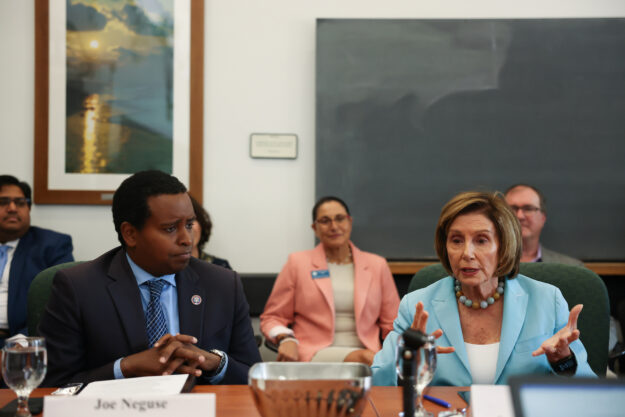Widgetized Section
Go to Admin » Appearance » Widgets » and move Gabfire Widget: Social into that MastheadOverlay zone
Pelosi, Neguse tout climate spending in IRA during scientific roundtable at NCAR

Not long after reading a handwritten note from the daughter of Boulder County sustainability official Susie Strife, U.S. House Speaker Nancy Pelosi emphasized that saving the planet is about protecting the nation’s children and their futures.
Pelosi and U.S. Rep. Joe Neguse of Lafayette joined a roundtable of scientists and climate experts at the National Center for Atmospheric Research in Boulder Wednesday to discuss how funding from the Inflation Reduction Act can help with research for climate action. The passage of the act is the single largest investment in climate action in U.S. history, allocating $5 billion for forest and reforestation investments and wildfire mitigation programs, $4 billion for the Bureau of Reclamation to combat drought conditions across the West, and $2 billion for federal labs throughout the country.
“Here in Colorado, federal scientists are continuing to produce and develop groundbreaking research that is literally forging the pathway for new energy and climate solutions, many happening right here at NCAR in our backyard,” Neguse said.
Pelosi said the scientific work being done to combat climate change in Colorado is a model for what needs to be done across the country. She said much of the work being done at facilities like NCAR “has been an inspiration” in creating bills like the Inflation Reduction Act, as well as the CHIPS and Science Act, which both passed this year. The latter measure is meant to spur more semiconductor companies to build chip plants in the U.S.
“We’re not just doing fundamental research, but we’re doing research that provides society with actionable information that it needs to adapt and become more resilient to these great environmental challenges that are unprecedented, really,” NCAR Director Everette Joseph said. U.S. House Speaker Nancy Pelosi visits the National Center for Atmospheric Research in Boulder, Aug. 31, 2022. (Kevin Mohatt for Colorado Newsline)
Many of the experts who spoke with Pelosi and Neguse emphasized that combating climate change is also a justice issue, because those who continue to be most vulnerable are mostly frequently hit the hardest.
“You’re taking a crisis and turning it into an opportunity,” Strife said. “We’re really, really proud that you have valued equity in the center of (the Inflation Reduction Act). If we’re not centering all the decision making and resources around what our community needs and listening to those historically excluded communities, we’re not doing the right thing.”
Robert Webb, director of the Physical Sciences Laboratory with the National Oceanic and Atmospheric Administration in Boulder, said one of his organization’s key goals is to not only provide accurate information, but to create equitable access to information. For example, NOAA is leading an interagency model and prediction of upcoming changes to hydro climatology, and Webb said this is “critical to allow us to manage our way through climate extremes in coming decades.”
Gretchen Mullendore, associate director of the Mesoscale and Microscale Meteorology Lab at NCAAR, also emphasized the importance of focusing climate action work on underserved communities. She said the convergence of science and communication is key to making sure these communities get the information they need, but also working directly with them toward building solutions.
“They are often what we say hit first and hit worst when it comes to natural disasters,” Mullendore said. “They’re hit first because they’re often in very vulnerable regions of the country — for instance the southeast U.S. coastal areas — and they’re hit worse because of chronic underresourcing. They do not have the capability to then recover from the disasters that occur.”
Paul Schlatter, sciences and operations officer with the National Weather Service, said Inflation Reduction Act funding could also contribute to scientific research to develop more accurate forecasting technology, which in turn can help minimize destruction from natural disasters. For example, Schlatter said accurate wind forecasting technology from NOAA was critical in combating the Marshall Fire in Boulder in December, providing information on how strong the wind would be, when it would hit and when it would let up to those on the ground fighting the fire.
“Most importantly, for the children, it is our moral responsibility to preserve the planet for them and pass it on to future generations,” Pelosi said. “We see it every day, whether it’s floods or fires or droughts or storms, you name it. The evidence is very clear. The science to address it is here, and the funds to make sure that we do the best we can are in this legislation for the children.”
Alex Isern, assistant director of the Directorate for Geosciences at the National Science Foundation, said at different educational institutions she sees the next generation of growing minds wanting to help make a difference.
“The students want to be part of the solution, and the funds that you’ve made available will help them do that,” Isern said. “It’s training that next generation of climate, atmospheric, environmental scientists that we need to solve these really complex problems.”
Editor’s note: This story first appeared in Colorado Newsline, which is part of States Newsroom, a network of news bureaus supported by grants and a coalition of donors as a 501c(3) public charity. Colorado Newsline maintains editorial independence. Contact Editor Quentin Young for questions: info@coloradonewsline.com. Follow Colorado Newsline on Facebook and Twitter.


